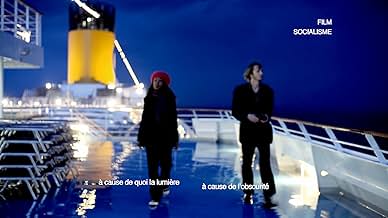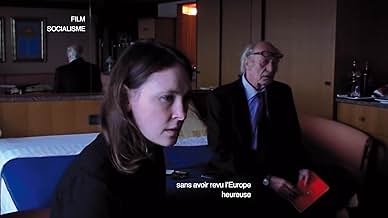Film socialisme
- 2010
- Tous publics
- 1h 42m
IMDb RATING
5.7/10
3K
YOUR RATING
The passengers on a Mediterranean cruise enjoy their luxuries as a small family struggles with overbearing media attention.The passengers on a Mediterranean cruise enjoy their luxuries as a small family struggles with overbearing media attention.The passengers on a Mediterranean cruise enjoy their luxuries as a small family struggles with overbearing media attention.
- Awards
- 5 wins & 2 nominations total
Agatha Couture
- Alissa (segment "Des choses comme ça")
- (as A. Couture)
Mathias Domahidy
- Mathias (segment "Des choses comme ça")
- (as M. Domahidy)
Quentin Grosset
- Ludovic (segment "Des choses comme ça")
- (as Q. Grosset)
Maurice Sarfati
- (segment "Des choses comme ça")
- (as M. Sarfati)
Nadège Beausson-Diagne
- Constance (segment "Des choses comme ça")
- (as N. Beausson)
Dominique Devals
- (segment "Des choses comme ça")
- (as D. Devals)
Marine Battaggia
- Florine "Flo" Martin (segment "Quo vadis Europa")
- (as M. Battaggia)
Featured reviews
Jean-Luc Godard is a reference in cinema and changed the art fifty years ago with a unique challenging style that defied current esthetics and etiquette.
His latest work can be described more as an eclectic experiment than any enduring piece of cinema, but it serves to show his mastery of the art and his ability to dissect it in its most basic components before trying to create a different, distinct experience for the viewer. He plays with themes, locations, styles and intermingles with little restriction photos, videos, ambient sounds, silence, music, narrations, monologues, dialogues to delves into a dream-like undefined cinematic discussion.
The film does not quite work as a whole, precisely from this lack of focus, but some of the imagery (some sharp and some out of focus, some old and some new, some seemingly meaningless and some full of allegories, etc.), dialogues (existential, simple, social, revolutionary) and intertitles do reach a cord and will be remembered subconsciously or consciously. It's lack of clear content or continuity should not take away from it's task of deconstruction and desire to destabilise our current comforts. In that aspect, Godard grabs the rug under conventional cinema and pulls very hard to make it topple over dumbfounded and confused.
There are three segments, each shorter than the previous, but besides being glad to finally leave this seemingly derelict boat and to briefly know a fictional philosophising family, there is not enough distinction between the segments to warrant further feedback at this point. Only that as Godard's life perhaps, and exemplified in the crafty ancient time-telling device in segment #2, time is getting shorter...
Maybe we'll get it right some day, may be one of many messages of this remue-méninges.
His latest work can be described more as an eclectic experiment than any enduring piece of cinema, but it serves to show his mastery of the art and his ability to dissect it in its most basic components before trying to create a different, distinct experience for the viewer. He plays with themes, locations, styles and intermingles with little restriction photos, videos, ambient sounds, silence, music, narrations, monologues, dialogues to delves into a dream-like undefined cinematic discussion.
The film does not quite work as a whole, precisely from this lack of focus, but some of the imagery (some sharp and some out of focus, some old and some new, some seemingly meaningless and some full of allegories, etc.), dialogues (existential, simple, social, revolutionary) and intertitles do reach a cord and will be remembered subconsciously or consciously. It's lack of clear content or continuity should not take away from it's task of deconstruction and desire to destabilise our current comforts. In that aspect, Godard grabs the rug under conventional cinema and pulls very hard to make it topple over dumbfounded and confused.
There are three segments, each shorter than the previous, but besides being glad to finally leave this seemingly derelict boat and to briefly know a fictional philosophising family, there is not enough distinction between the segments to warrant further feedback at this point. Only that as Godard's life perhaps, and exemplified in the crafty ancient time-telling device in segment #2, time is getting shorter...
Maybe we'll get it right some day, may be one of many messages of this remue-méninges.
Far to be a Godard admirer, I was real seduced by this film, a mix of cultural references about Mediteranean area, a good pledge for language as obstacle of understanding, eccentric, innovative, absurd in essence, proposing characters and theirs memories and believes , but not exactly a story.
A film about time and masks and past and facts as pieces of puzzle , it is a provocative invitation to viewer to create his explanations or - and doubts.
For me, the old watch is the main scene defining this film who remains a clash by fragments of doczmentary, stains of kitsch and rediscover of past. All, in essence, in the most honest manner.
A film about time and masks and past and facts as pieces of puzzle , it is a provocative invitation to viewer to create his explanations or - and doubts.
For me, the old watch is the main scene defining this film who remains a clash by fragments of doczmentary, stains of kitsch and rediscover of past. All, in essence, in the most honest manner.
Steve Pulaskie's negative review of "Film Socialisme" inadvertently, by its very length and detail, betrays the fascination a good Godard can exert even on the "unimpressed." I'll let the positive reviews -- not all of which I have read -- speak to my own liking for this film. I need to see it more times, especially after my French is more fluent than it is. But my take is that "Film Socialisme" is meant to provoke thought and questions, not answer them ... notwithstanding one can pick up a good notion of where Godard is coming from. But -- to echo any other reviews that have said the same -- "Film Socialisme" should NEVER be anyone's introduction to Godard! Whether or not it's really his last film, it comes 50+ years after his first films blew up the way everyone made movies ... and, yes, they even have plots. I have seen only a few of them, but am buying up more. The main IMDb web-page features a number of fans listing their top Godards; I refer newbies to them. By all means see "A bout de soufflé," "Une femme est une femme," "Alphaville," "Pierrot le Fou," "Band of Outsiders," and maybe "Weekend" -- and only then try "Film Socialisme." But this last film shows me Godard hasn't lost a thing he started with. He still has all his outrageous playful inventiveness, exuberant effrontery: he still makes a movie MOVE; this film is more CINEMA than the most CINEMA flick he ever tossed off. See the early ones -- on which his rep will always rest -- then re-see this one. Whether you like "Film Socialisme" or not, you'll know what I mean.
I get quite excited at the prospect of a new Godard. Not that I see his work as any ultimate example. It's not. But somehow it is in a different milieu to most films you can watch. Like poetry, it's not about the words or images, but the joy that comes from exploring, from original thought. Sound and vision used not to entertain but to seek deeper levels than can be expressed in prose or 'narrative cinema as we know it.' Yet the slew of bad reviews prepared me for the worst. Perhaps age had caught up with the grand master of Nouvelle Vague? Or perhaps Godard was not beyond playing a joke on his audience, just to see what they make of it?
Omens weren't great. A small auditorium and no more than a dozen people there as I walk in. Some obviously by mistake. As they walk out halfway through. But I am already entranced. Wondering if I will be able to see it again in the final screening tomorrow. Looking forward to the DVD so I can stop-start for quotes that send my head spinning like I'm back in my alma mater's philosophy class. A dizzying array of original and masterly techniques. And, like poetry, enough fluidity to offer meanings in ways that suit the individual viewer (persons who walked out excepted).
A warning: there is a 'looking for answers' but no real story. On a difficulty level, this film is much harder than Breathless, Le Mepris, or Vivre Sa Vie. It is warmer and more captivating than Weekend or Made in USA, but only just. Neither does it have the clear expository style of his last most recent well-known movie, Notre Musique. It has three main sections: 1 - scenes on a Mediterranean cruise ship ('Things'), 2 - a European family ('Our Europe'), and 3 - scenes of conflict and war ('Humanities'). Each seeks understanding to certain questions on an individual, interpersonal and political level.
The first section held my attention the most. Inside the cruise ship is a plethora of "things" (if this was Godard of yesteryear, I'd maybe have written 'bourgeois distractions.') Only when we go outside, or see the light shine in, do we experience crisp photography, scenes of genuine beauty, and people spending their time at least trying to solve some of life's deeper puzzles. Perhaps this is just my own interpretation, but I like the way it is depicted visually. Money is a 'common good' – like water – but party-people onboard use it for nothing but bloated consumerism. Meaningless dance classes and revelry. As two people engage in philosophical discourse outside the main hall, a woman repeatedly falls against the glass partition. Is she dancing and letting her spirit free? Apparently not – she falls face down into the swimming pool.
There is a young girl seen frequently with an old man. Something strange there? A hooker perhaps? A maybe rather a scholar or seeker of truth – availing herself of the rich variety of elderly experience onboard (a philosopher, a UN bureaucrat, a Palestinian ambassador, and so on).
Characteristic Godardian effects are used with casual precision. There is no attempt at reality if it stands in the way of the point he is making. Such as when the background noise cuts out momentarily for the word 'happiness' to occurs in the girl's dialogue. Deliberate camera distortions emphasise an alcohol-sodden mentality of the majority of passengers, images often obscenely blurred, as if taken on a mobile phone. Or the mother in Section Two who talks to the camera about how she is totally unaware of the part she is playing.
There are more hidden references than an afternoon of Tarantino movies. Except, unlike Tarantino's work, Godard is not entertaining pub quiz movie geeks; but giving clues to further meanings within his experimental and exploratory work. A young lad gives a young woman a copy of 'La Porte Entroite,' (a coming of age novel). There are nods to Husserl's philosophical geometry which fit the film but will need hours of study to fully appreciate (we see a projection of a man lecturing on 'geometry as origin' – to an empty auditorium). And Balzac's 'Illusions Perdues,' which anticipates themes of aristocracy vs poverty as well as journalism as intellectual prostitution. And don't miss the homage later to Battleship Potemkin's Odessa Staircase slaughter.
Dialogue sparkles from witty – "The United Nations have been somewhat disunited since 1948," to surreal and Zen-like – "Once in 1942 I have encountered nothingness . . ." I'm quoting from memory and leaving the end of the quote for you to enjoy on screen.
The individual's relation to government is addressed by the adolescents in the second Section, posing a difference between the State and Society. The dream of the State is to be 'one'; whereas the dream of the Individual is to be two, to 'pair up.' Aggressively intrusive foreigners demanding driving directions are given a cold shoulder ("Go and invade some other country!") An intrusive camera, making a documentary about a coming election, similarly distances everyone from any (inner) reality.
Some of the phrases from Section Two bleed over into scenes of Section Three bloodshed. The young girl wants people to, "learn to see before learning to read." Godard's intertitles come fast and frequent, and in many different languages. At one point, a prayer in Hebrew and a prayer in Arabic are overlaid, visually and aurally. It recalls Godard's offhand response to the question, "Peace In the Middle East - when?" by replying, "As soon as Israel and Palestine introduce six million dogs and stroll with them as neighbours who don't speak, who don't speak of something else." Cinema is a remarkable opportunity sometimes to communicate without speaking those things which are often too difficult, or too sensitive, or simply whitewashed of their core by aimless chatter. Or by narrative movies.
Omens weren't great. A small auditorium and no more than a dozen people there as I walk in. Some obviously by mistake. As they walk out halfway through. But I am already entranced. Wondering if I will be able to see it again in the final screening tomorrow. Looking forward to the DVD so I can stop-start for quotes that send my head spinning like I'm back in my alma mater's philosophy class. A dizzying array of original and masterly techniques. And, like poetry, enough fluidity to offer meanings in ways that suit the individual viewer (persons who walked out excepted).
A warning: there is a 'looking for answers' but no real story. On a difficulty level, this film is much harder than Breathless, Le Mepris, or Vivre Sa Vie. It is warmer and more captivating than Weekend or Made in USA, but only just. Neither does it have the clear expository style of his last most recent well-known movie, Notre Musique. It has three main sections: 1 - scenes on a Mediterranean cruise ship ('Things'), 2 - a European family ('Our Europe'), and 3 - scenes of conflict and war ('Humanities'). Each seeks understanding to certain questions on an individual, interpersonal and political level.
The first section held my attention the most. Inside the cruise ship is a plethora of "things" (if this was Godard of yesteryear, I'd maybe have written 'bourgeois distractions.') Only when we go outside, or see the light shine in, do we experience crisp photography, scenes of genuine beauty, and people spending their time at least trying to solve some of life's deeper puzzles. Perhaps this is just my own interpretation, but I like the way it is depicted visually. Money is a 'common good' – like water – but party-people onboard use it for nothing but bloated consumerism. Meaningless dance classes and revelry. As two people engage in philosophical discourse outside the main hall, a woman repeatedly falls against the glass partition. Is she dancing and letting her spirit free? Apparently not – she falls face down into the swimming pool.
There is a young girl seen frequently with an old man. Something strange there? A hooker perhaps? A maybe rather a scholar or seeker of truth – availing herself of the rich variety of elderly experience onboard (a philosopher, a UN bureaucrat, a Palestinian ambassador, and so on).
Characteristic Godardian effects are used with casual precision. There is no attempt at reality if it stands in the way of the point he is making. Such as when the background noise cuts out momentarily for the word 'happiness' to occurs in the girl's dialogue. Deliberate camera distortions emphasise an alcohol-sodden mentality of the majority of passengers, images often obscenely blurred, as if taken on a mobile phone. Or the mother in Section Two who talks to the camera about how she is totally unaware of the part she is playing.
There are more hidden references than an afternoon of Tarantino movies. Except, unlike Tarantino's work, Godard is not entertaining pub quiz movie geeks; but giving clues to further meanings within his experimental and exploratory work. A young lad gives a young woman a copy of 'La Porte Entroite,' (a coming of age novel). There are nods to Husserl's philosophical geometry which fit the film but will need hours of study to fully appreciate (we see a projection of a man lecturing on 'geometry as origin' – to an empty auditorium). And Balzac's 'Illusions Perdues,' which anticipates themes of aristocracy vs poverty as well as journalism as intellectual prostitution. And don't miss the homage later to Battleship Potemkin's Odessa Staircase slaughter.
Dialogue sparkles from witty – "The United Nations have been somewhat disunited since 1948," to surreal and Zen-like – "Once in 1942 I have encountered nothingness . . ." I'm quoting from memory and leaving the end of the quote for you to enjoy on screen.
The individual's relation to government is addressed by the adolescents in the second Section, posing a difference between the State and Society. The dream of the State is to be 'one'; whereas the dream of the Individual is to be two, to 'pair up.' Aggressively intrusive foreigners demanding driving directions are given a cold shoulder ("Go and invade some other country!") An intrusive camera, making a documentary about a coming election, similarly distances everyone from any (inner) reality.
Some of the phrases from Section Two bleed over into scenes of Section Three bloodshed. The young girl wants people to, "learn to see before learning to read." Godard's intertitles come fast and frequent, and in many different languages. At one point, a prayer in Hebrew and a prayer in Arabic are overlaid, visually and aurally. It recalls Godard's offhand response to the question, "Peace In the Middle East - when?" by replying, "As soon as Israel and Palestine introduce six million dogs and stroll with them as neighbours who don't speak, who don't speak of something else." Cinema is a remarkable opportunity sometimes to communicate without speaking those things which are often too difficult, or too sensitive, or simply whitewashed of their core by aimless chatter. Or by narrative movies.
I'll admit that I've only seen a handful of Jean-Luc Godard's movies. "Film socialisme" is the latest. Very bizarre movie. In fact, it doesn't really emphasize a plot. It's hard to tell what the movie's emphasis is supposed to be, with the focus on a group of people aboard a cruise ship in the Mediterranean. Maybe Godard wanted to address the use of certain places as tourist meccas, but I couldn't be certain. With current events in the world, it's probably significant that the movie includes Palestine.
I'd like to see the rest of Godard's movies, but I doubt that I'll ever be able to truly understand what sort of point he was trying to make with this one.
Watch for singer-songwriter Patti Smith in a brief appearance.
I'd like to see the rest of Godard's movies, but I doubt that I'll ever be able to truly understand what sort of point he was trying to make with this one.
Watch for singer-songwriter Patti Smith in a brief appearance.
Did you know
- TriviaThe film did not include traditional English language subtitles for releases in countries that spoke such language. Instead, the subtitles were in "Navajo English", a translation that baffled many critics and audience members.
- GoofsSomeone claims that Napoleon founded the Comédie-Française in 1812 in Moscow. Actually, it was founded in 1680 by Louis XIV.
- Quotes
Rebecca (segment "Des choses comme ça"): [dialogue continuity] You're absolutely right: I don't love any "people." Not French, not North American, not German. Not Jewish people, not black people. I love only my friends... When there are any.
- ConnectionsEdited from Le cuirassé Potemkine (1925)
- SoundtracksMamita mia
Performed by Ernst Busch
- How long is Film socialisme?Powered by Alexa
Details
- Release date
- Countries of origin
- Official site
- Languages
- Also known as
- Film Socialism
- Filming locations
- Production companies
- See more company credits at IMDbPro
Box office
- Gross US & Canada
- $42,925
- Opening weekend US & Canada
- $4,526
- Jun 5, 2011
- Gross worldwide
- $222,079
Contribute to this page
Suggest an edit or add missing content

























